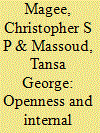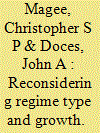| Srl | Item |
| 1 |
ID:
102509


|
|
|
|
|
| Publication |
2011.
|
| Summary/Abstract |
This article examines the relationship between economic openness and internal conflict. The article first discusses different theoretical perspectives on how openness affects a country's internal stability and how internal conflict affects openness. Next, empirical estimates of the relationship between conflict and openness are presented, where conflict is measured with both a civil war dummy variable and an events dataset. The correlation between openness and conflict in the data is negative: more open countries have less internal conflict by some measures. However, internal conflict affects the level of openness, which suggests that openness should be treated as an endogenous variable. When the effect of openness on conflict is estimated using instrumental variables or full information maximum likelihood to control for endogeneity, openness does not significantly reduce internal conflict. There is robust evidence, on the other hand, that conflict within a country reduces its international trade. Together, these results suggest that the negative correlation between openness and conflict emerges because stability facilitates international trade rather than because trade flows reduce internal conflict.
|
|
|
|
|
|
|
|
|
|
|
|
|
|
|
|
| 2 |
ID:
139525


|
|
|
|
|
| Summary/Abstract |
Some recent papers have concluded that authoritarian regimes have faster economic growth than democracies. These supposed growth benefits of autocracies are estimated using data sets in which growth rates rely heavily on data reported by each government. Governments have incentives to exaggerate their economic growth figures, however, and authoritarian regimes may have fewer limitations than democracies on their ability to do so. This paper argues that growth data submitted to international agencies are overstated by authoritarian regimes compared to democracies. If true, it calls into question the estimated relationship between government type and economic growth found in the literature. To measure the degree to which each government's official growth statistics are overstated, the economic growth rates reported in the World Bank's World Development Indicators are compared to a new measure of economic growth based on satellite imaging of nighttime lights. This comparison reveals whether or not dictators exaggerate their true growth rates and by how much. Annual GDP growth rates are estimated to be overstated by 0.5–1.5 percentage points in the statistics that dictatorships report to the World Bank.
|
|
|
|
|
|
|
|
|
|
|
|
|
|
|
|